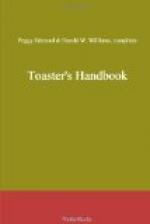“That looks a good deal like the infernal regions.”
An English lady, overhearing the remark, said to another:
“Good gracious! How these Americans do travel.”
An American tourist hailing from the west was out sight-seeing in London. They took him aboard the old battle-ship Victory, which was Lord Nelson’s flagship in several of his most famous naval triumphs. An English sailor escorted the American over the vessel, and coming to a raised brass tablet on the deck he said, as he reverently removed his hat:
“’Ere, sir, is the spot where Lord Nelson fell.”
“Oh, is it?” replied the American, blankly. “Well, that ain’t nothin’. I nearly tripped on the blame thing myself.”
On one of the famous scenic routes of the west there is a brakeman who has lost the forefinger of his right hand.
His present assignment as rear-end brakeman on a passenger train places him in the observation car, where he is the target for an almost unceasing fusillade of questions from tourists who insist upon having the name, and, if possible, the history, of all the mountain canons and points of interest along the route.
One especially enthusiastic lady tourist had kept up her Gattling fire of questions until she had thoroughly mastered the geography of the country. Then she ventured to ask the brakeman how he had lost his finger:
“Cut off in making a coupling between cars, I suppose?”
“No, madam; I wore that finger off pointing out scenery to tourists.”
Know most of the rooms of thy native country before thou goest over the threshold thereof.—Fuller.
When I was at home, I was in a better place; but travelers must be content.—Shakespeare.
As the Spanish proverb says, “He who would bring home the wealth of the Indies must carry the wealth of the Indies with him.” So it is in traveling: a man must carry knowledge with him, if he would bring home knowledge.—Samuel Johnson.
TREASON
It was during the Parnell agitation in Ireland that an anti-Parnellite, criticising the ways of tenants in treating absentee landlords, exclaimed to Archbishop Ryan of Philadelphia: “Why, it looks very much like treason.”
Instantly came the answer in the Archbishop’s best brogue: “Sure, treason is reason when there’s an absent ’t’.”
Treason doth never prosper: what’s
the reason?
Why if it prosper, none dare call it treason.
TREES
CURIOUS CHARLEY—“Do nuts grow on trees, father?”
FATHER—“They do, my son.”
CURIOUS CHARLEY—“Then what tree does the doughnut grow on?”
FATHER—“The pantry, my son.”
TRIGONOMETRY
A prisoner was brought before a police magistrate. He looked around and discovered that his clerk was absent. “Here, officer,” he said, “what’s this man charged with?”




